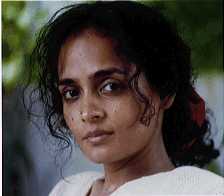| the-south-asian.com SEPTEMBER 2001 | ||
| about us contact us data bank past issues the craft shop the print gallery | ||
|
SEPTEMBER 2001 Contents Interview Heritage Cultural Heritage of south Asia People Communities Lifestyle Films Editor's Note
Books
|
Page 6 of 6 Arundhati Roy interviewed by David Barsamian (continued)
"Every night outside my house I pass a road gang of emaciated labourers digging a trench to lay fiber optic cables to speed up our digital revolution. They work by the light of a few candles. That is what is happening in India today."
Q: You use a metaphor of two truck convoys. One is very large, with many people going off into the darkness. The other is much smaller and is going into the light of the promised land. Explain what you mean. Roy: India lives in several centuries at the same time. Every night outside my house I pass a road gang of emaciated laborers digging a trench to lay fiber optic cables to speed up our digital revolution. They work by the light of a few candles. That is what is happening in India today. The convoy that melts into the darkness and disappears doesn't have a voice. It doesn't exist on TV. It doesn't have a place in the national newspapers. And so it doesn't exist. Those who are in the small convoy on their way to this glittering destination at the top of the world have completely lost the ability to see the other one. So in Delhi the cars are getting bigger and sleeker, the hotels are getting posher, the gates are getting higher, and the guards are no longer the old chowkidars, the watchmen, but they are fellows with guns. And yet the poor are packed into every crevice like lice in the city. People don't see that anymore. It's as if you shine a light very brightly in one place, the darkness deepens around. They don't want to know what's happening. The people who are getting rich can't imagine that the world is not a better place. Q: You made a decision, or the decision was made for you, to identify with, or to be part of, that large convoy.Roy: I can't be a part of the large convoy because it's not a choice that you can make. The fact that I'm an educated person means that I can't be on that convoy. I don't want to be on it. I don't want to be a victim. I don't want to disappear into the darkness. I am an artist and a writer, and I do think that one always places oneself in the picture to see where one fits. I left home when I was sixteen and lived in places where it was very easy for me to have fallen the other way. I could have been on the large convoy because I was a woman and I was alone. In India, that's not a joke. I could have ended up very, very badly. I'm lucky that I didn't. I think my eyes were knocked open and they don't close. I sometimes wish I could close them and look away. I don't always want to be doing this kind of work. I don't want to be haunted by it. Because of who I am and what place I have now in India, I'm petitioned all the time to get involved. It's exhausting and very difficult to have to say, 'Look, I'm only one person. I can't do everything.' I know that I don't want to be worn to the bone where I lose my sense of humor. But once you've seen certain things, you can't un-see them, and seeing nothing is as political an act as seeing something.Q: Are you thinking about writing any new fiction? Roy: I need fiction like you need to eat or exercise, but right now it's so difficult. At the moment, I don't know how to manage my life. I don't know how I'll ever be able to make the space to say, "I'm writing a book now, and I'm not going to be able to do x or y." I would love to.Q: You feel a sense of responsibility to these silent voices that are calling out to you.Roy: No, I don't feel responsibility because that's such a boring word.Q: You're in a privileged position. You are a celebrity within India and also outside.Roy: But I never do anything because I'm a celebrity, as a rule. I do what I do as a citizen. I stand by what I write and follow through on what I write. It's very easy for me to begin to believe the publicity about myself, whether for or against. It can give you an absurd idea of yourself. I know that there's a fine balance between accepting your own power with grace and misusing it. And I don't ever want to portray myself as a representative of the voiceless. I'm scared of that. But one of the reasons some people get so angry with me is because I have the space now that a lot of others who think like me don't. It was a mistake maybe for so many people to have opened their hearts to The God of Small Things. Because a lot of dams and bombs slipped in along with it. _________________________
Copyright © 2000 - 2001 [the-south-asian.com]. Intellectual Property. All rights reserved. |
|
